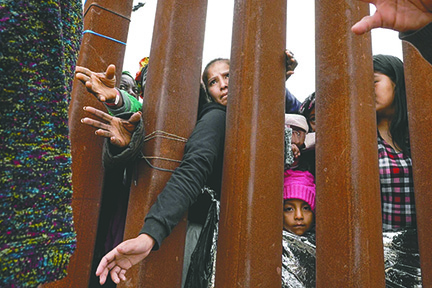
Cierre de la Frontera: Los Latinos serán los más afectados por las Deportaciones
Border Closure: Latinos will be the most affected by Deportations
Un memorándum enviado a los agentes fronterizos de San Diego (California) revela las nacionalidades de los migrantes que tienen más posibilidades de ser repatriados
La orden ejecutiva emitida por la Administración Biden la semana pasada, que suspende la entrada a Estados Unidos de los inmigrantes que crucen ilegalmente la frontera sur, ha disparado las deportaciones y en consecuencia los vuelos de repatriación. En el documento publicado por la Casa Blanca se lee que el Departamento de Seguridad Nacional habría deportado este año a 750.000 migrantes, la cifra más alta registrada durante un año fiscal desde 2010, pero se desconocen cuántas deportaciones se han producido desde la entrada en vigor de las nuevas medidas.
El boicot de los republicanos en el Senado al proyecto de ley que estimaba el gasto de 14.000 millones de dólares en materia migratoria ha puesto al Gobierno de Biden frente a la escasez de recursos tanto económicos como logísticos para atender la crisis en la frontera. Además, el decreto presidencial carece de un reglamento para su ejecución. Esta situación ocasiona que algunos migrantes tengan más posibilidades de ser deportados que otros, como quedó en evidencia con el memorándum enviado a agentes fronterizos de San Diego (California) a quienes se les instó a liberar o arrestar inmigrantes según su nacionalidad.
Las nacionalidades con más
probabilidad de deportación
La orden puntual para migrantes de Cuba, Nicaragua, Haití y Venezuela, que son naciones con la opción de ingresar a Estados Unidos de forma legal a través del parole humanitario, es deportación inmediata o retiro voluntario, una opción que les permite salir de Estados Unidos sin el estatus de deportado. Este también es el caso de El Salvador, Honduras, Guatemala y México.
Los vuelos de repatriación a Centroamérica son habituales así como el traslado de inmigrantes mexicanos hasta la frontera. Según registros de la organización Witness at the Border, el Servicio de Inmigración y Control de Aduanas (ICE, por sus siglas en inglés) realizó 679 vuelos de repatriación entre enero y mayo de este año. El 60% de los mismos tuvo como destino Guatemala y Honduras. También se contabilizaron vuelos a Colombia (46), Ecuador (42) y Perú (12).
Las familias de migrantes provenientes de Colombia, Perú, México, El Salvador, Guatemala, Honduras y República Dominicana que sean detenidas en la frontera podrán ser deportadas a través del programa de deportación acelerada de familias.
Si alguno de los inmigrantes es liberado bajo el amparo del Programa Alternativo de Detención (tras el pago de una fianza y la colación de un monitor que rastrea sus movimientos), ello no lo deja exento de una posible deportación, pero tendrá el beneficio de permanecer en el país mientras recibe la cita para presentarse ante el juez que determinará su situación. El criticado decreto migratorio de Biden apunta que los inmigrantes que expresen “un miedo razonable” de volver a sus países podrán entrevistarse con un agente para conseguir que se suspenda su repatriación, pero no el asilo.
En este año electoral, las liberaciones como las antes mencionadas se definen bajo las prioridades de la Admistración Biden, y el foco de expulsar a todos aquellos extranjeros que representan una amenaza a la seguridad nacional, pública o fronteriza de Estados Unidos.
Las nacionalidades más difíciles de deportar
El citado memorándum establece que todos los migrantes del hemisferio oriental deberán ser liberados, exceptuando los adultos solos de países como Georgia, Moldavia, Kirguistán, Rusia, Tayikistán y Uzbekistán, a quines no les permitirá ingresar al país o pedir asilo. Serán entregados al Servicio de Inmigración y Control de Aduanas (ICE) para su deportación.
El documento, que en este apartado va en contra de la propia orden ejecutiva de Biden, categoriza a los inmigrantes como “difíciles” de expulsar debido a la falta de convenios migratorios o de buenas relaciones diplomáticas con sus respectivos países, pero la razón también es económica. El costo de los vuelos de repatriación a estas naciones es mucho más alto. Los datos de Witness at the Border indican que entre enero y mayo de este año solo hubo 10 vuelos de deportación a África y uno a China, pese a que más de 13.000 inmigrantes de este país han sido arrestados en la frontera sur.
A memo sent to San Diego border agents (California) reveals the nationalities of migrants who are most likely to be repatriated
The executive order issued by the Biden Administration last week, which suspends the entry into the United States of immigrants who illegally cross the southern border, has triggered deportations and consequently repatriation flights. The document published by the White House states that the Department of Homeland Security would have deported 750,000 migrants this year, the highest number recorded during a fiscal year since 2010, but it is unknown how many deportations have occurred since the entry into force of the the new measures.
The boycott by Republicans in the Senate of the bill that estimated the expenditure of 14 billion dollars on immigration has put the Biden Government facing a shortage of both economic and logistical resources to address the crisis at the border. Furthermore, the presidential decree lacks regulations for its execution. This situation causes some migrants to be more likely to be deported than others, as evidenced by the memo sent to border agents in San Diego (California) who were urged to release or arrest immigrants based on their nationality.
The nationalities with the most
probability of deportation
The specific order for migrants from Cuba, Nicaragua, Haiti and Venezuela, which are nations with the option of entering the United States legally through humanitarian parole, is immediate deportation or voluntary withdrawal, an option that allows them to leave the United States. without deported status. This is also the case of El Salvador, Honduras, Guatemala and Mexico.
Repatriation flights to Central America are common, as is the transfer of Mexican immigrants to the border. According to records from the organization Witness at the Border, Immigration and Customs Enforcement (ICE) carried out 679 repatriation flights between January and May of this year. 60% of them were destined for Guatemala and Honduras. Flights to Colombia (46), Ecuador (42) and Peru (12) were also recorded.
Families of migrants from Colombia, Peru, Mexico, El Salvador, Guatemala, Honduras and the Dominican Republic who are detained at the border may be deported through the accelerated family deportation program.
If any of the immigrants are released under the protection of the Alternative Detention Program (after paying a bond and having a monitor track their movements), this does not exempt them from possible deportation, but they will have the benefit of remaining in the country while you receive the appointment to appear before the judge who will determine your situation. Biden’s criticized immigration decree points out that immigrants who express “a reasonable fear” of returning to their countries may meet with an agent to have their repatriation suspended, but not asylum.
In this election year, releases such as those mentioned above are defined under the priorities of the Biden Administration, and the focus of expelling all those foreigners who represent a threat to the national, public or border security of the United States.
The most difficult nationalities to deport
The aforementioned memorandum establishes that all migrants from the Eastern Hemisphere must be released, except for single adults from countries such as Georgia, Moldova, Kyrgyzstan, Russia, Tajikistan and Uzbekistan, who will not be allowed to enter the country or request asylum. They will be handed over to Immigration and Customs Enforcement (ICE) for deportation.
The document, which in this section goes against Biden’s own executive order, categorizes immigrants as “difficult” to expel due to the lack of immigration agreements or good diplomatic relations with their respective countries, but the reason is also economical. The cost of repatriation flights to these nations is much higher. Data from Witness at the Border indicates that between January and May of this year there were only 10 deportation flights to Africa and one to China, despite the fact that more than 13,000 immigrants from this country have been arrested at the southern border.























